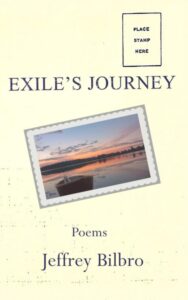
Jeffrey Bilbro looks at what makes us human in an age of technology
My introduction to Jeffrey Bilbro came through the internet. It was likely a link in someone’s post (now forgotten). But I clicked and landed at a site called Front Porch Republic.
Bilbro is the editor-in-chief and an occasional writer, but it is mostly written by others. If you familiar with Wendell Berry or perhaps Paul Kingsnorth, then you’ll find Front Porch Republic familiar. It’s about community, land and landscape and how people interact with them, and th the things that threaten, like economic concentration and power. It’s also about the things that matter – family, children, neighbors, and friends – the kinds of things that people must work hard to make last.

Jeffrey Bilbro
When he’s not editing Front Porch Republic, Bilbro is an associate professor of English at Grove City College in Pennsylvania. I knew he had published non-fiction books, but I didn’t know he was a poet. Exile’s Journey is his first collection.
It’s aptly named. When you believe in and work hard at themes and ideas like localism, preserving community, and preserving what makes us human in this age of the machine, you’re making yourself something of an exile, a wanderer, a counter-culturalist who’s out of step with notions of “progress” (you can see the connection to Berry).
Bilbro writes about an array of subjects – the Book of Kells, St. Mark’s Cathedral in Venice, a business plan for how to be a though leader (or influencer), and poetry (it’s not “a hamburger. / It’s not a therapy or a diet. / It’s not even a hairbrush”), to mention only a few. And then he turns his eye to nature and landscape, the things we most often use to remember and define home or community.
He considers his birthplace of Washington State, the seasons, the migrations of birds, and even trapping mice. His expression of the end of autumn becomes an expression of wonder at what it means to be human.
The Fall

standing corn mown,
the blazing maples shorn
by frost and wind, the stench
of manure spread over stubble.
Like a prophecy, the strange
trumpet of a sandhill crane
sounds above bare, skeletal
trees, heralding this arrival
on long spindly legs.
The grace of his landing amazes
by its ancient survival.
Where are we
that such creatures fly
down from the blue sky
and light among us?
The last question begs another question. It’s not only where are we, but also who are we?
Bilbro previously published Words for Conviviality: Media Technologies and Practices of Hope and Reading the Times: A Literary and Theological Inquiry into the News. He received a B.A. degree from George Fox University in Oregon and a Ph.D. in English from Baylor University in Texas. He lives in Pennsylvania.
Exile’s Journey concerns the important thing of life, those things we too often ignore, neglect, disparage, or forget in contemporary life. Our existence may be defined not by how many likes and followers we have on social media, but rather on how overwhelmed we are with thankfulness at the millions of stars in the night sky, and that baby we hold in our arms.
Related:
Reading the Times by Jeffrey Bilbro.
Photo by Mark, Creative Commons, via Flickr. Post by Glynn Young.
How to Read a Poem uses images like the mouse, the hive, the switch (from the Billy Collins poem)—to guide readers into new ways of understanding poems. Anthology included.
“I require all our incoming poetry students—in the MFA I direct—to buy and read this book.”
—Jeanetta Calhoun Mish
- Poets and Poems: Donna Vorreyer and “Unrivered” - October 7, 2025
- Poet Sidney Lanier and the Lost Cause - October 2, 2025
- Poets and Poems: A.J. Thibault and “We Lack a Word” - September 30, 2025


Leave a Reply